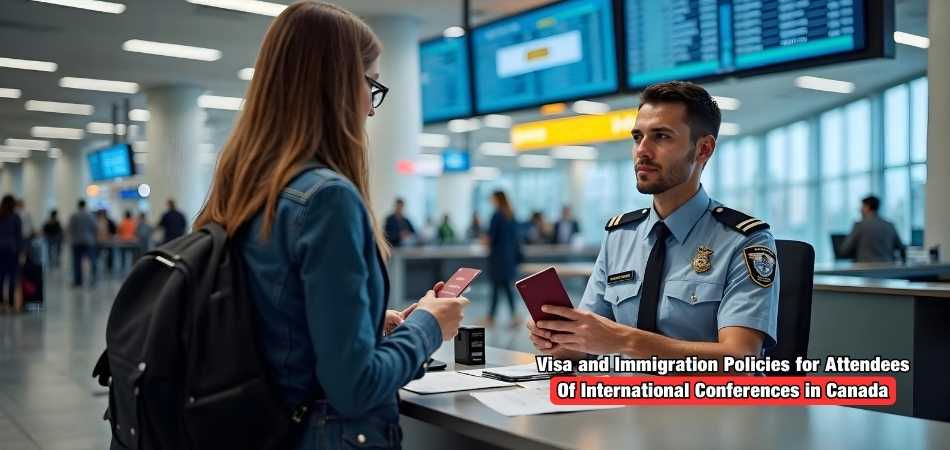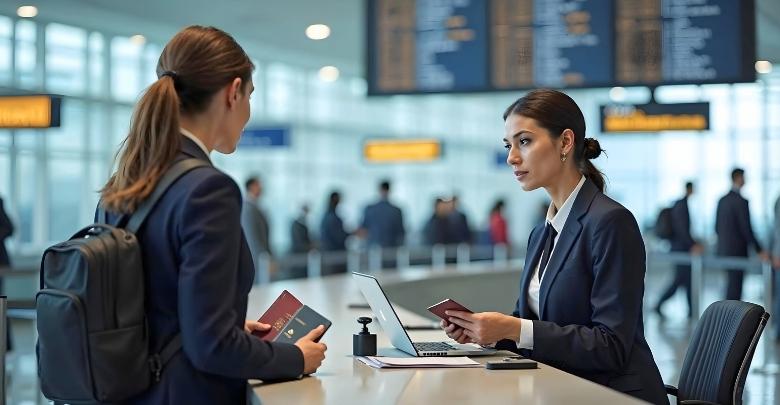Visa and immigration policies refer to the rules that govern entry and stay for visitors in a specific country. For conference attendees traveling to Canada, being aware of these regulations is essential to ensure legal entry, which leads to the question: What are the visa and immigration policies for attendees of international conferences in Canada?
International conference attendees may need a Temporary Resident Visa (TRV) or an Electronic Travel Authorization (eTA) based on their nationality. Applicants must provide documents like a valid passport, proof of funds, and a conference invitation. Processing times vary, so early applications are crucial to avoid delays.
Are you curious about the process and requirements? Read on to discover all the necessary details about visa and immigration policies for attending conferences in Canada. This guide covers everything you need to know to plan a smooth trip!
Why is Knowing Canada’s Visa and Immigration Policies Essential for Conference Attendees?
Those who intend to attend a conference should be aware of Canada’s immigration and visa regulations. Without knowing the rules, attendees may face issues that delay or prevent participation. Knowing these policies ensure smooth entry and timely attendance, avoiding complications at borders or airports.
Keeping up to date on Canada’s visa and immigration laws is crucial for international travelers. This knowledge helps to avoid confusion or delays. Knowing which documents to prepare can make the process easier and faster. Before traveling, make sure you know if you need a visa for your nationality.
Attendees who are preparing for a conference in Canada must make sure their visa and immigration documents are in order. This ensures they can participate without delay. By reviewing the visa process, attendees can confidently travel to Canada for their conference experience.
What Are the Visa and Immigration Policies for Attendees of International Conferences in Canada?
Taking part in international conferences in Canada offers great opportunities to learn and network. However, attendees from other countries must follow Canada’s visa and immigration rules to enter the country legally. Below, we provide essential details about the visa and immigration procedures.
Knowing the Canada Visa Requirements
Foreign nationals planning to attend conferences in Canada generally require a visa or an Electronic Travel Authorization (eTA). Certain countries’ citizens can apply for the simpler eTA for air travel, while others need a Temporary Resident Visa (TRV) for short-term stays. The type of visa depends on the applicant’s nationality and travel plans.
Temporary Resident Visa (TRV) Application Process
To apply for a TRV, attendees must submit their application online or at a local Canadian consulate. Some applicants also need to submit biometric data. If you want your application to be processed as quickly as possible, you should apply well in advance.
Required Documents for Visa Application
When applying for a visa, applicants must provide documents such as a valid passport, proof of sufficient funds, and conference details. An invitation letter from the conference organizers, confirming the purpose of the visit, is often necessary. This letter serves as a key document to support the visa application and secure approval.
The Role of the Invitation Letter
When it comes to conference attendees’ visa applications, the invitation letter is crucial. Organizers must send an official letter confirming the event details, including the attendee’s role or participation. This letter assures the Canadian authorities that the attendee’s visit is for a legitimate conference purpose, which is crucial for visa approval.
Visa Processing Time and Costs
Depending on the nationality of the applicant and the volume of applications received at the time, visa processing times may differ. In general, it may take several weeks. It’s recommended that attendees apply as early as possible. The visa fee also varies, and applicants should confirm the exact amount from the official Canadian government website.
Electronic Travel Authorization (eTA) for Certain Nationals
Certain nationals can apply for an eTA instead of a visa, simplifying the process. The eTA is available for travelers from visa-exempt countries and is required for air travel to Canada. However, the eTA is only valid for tourism or conference attendance, not for work or study purposes, and requires a simple online application.
Border Control and Immigration Procedures
After arrival at Canadian borders, attendees must show their visa or eTA approval. Border officers will review the documents and ask about the visit’s purpose. To ensure a smooth entry into Canada, all documents, including the conference invitation, must be in order. Attendees who want to ensure diversity and inclusion at an international conference in Canada must follow all immigration rules to avoid complications.
Restrictions and Special Considerations
There may be extra requirements or limitations on travel, particularly in reaction to evolving health policies or other laws. Attendees should stay informed about current travel guidelines and restrictions, which may affect entry to Canada. Always check the latest travel advice on official Canadian government websites to ensure compliance with all regulations.
Extending Stay or Changing Visa Status
If an attendee wishes to stay in Canada longer than the duration of their visa, they must apply for an extension before their visa expires. Similarly, if someone needs to change their visa status, such as switching from a visitor to a student or work visa, they must follow the proper procedure and obtain approval from immigration authorities.
For the most accurate and up-to-date information on visa applications and immigration procedures, visit the official Canadian immigration website or consult the nearest Canadian consulate. Always check for any changes or updates before making travel arrangements.
Key Documents Are Required for a Canada Visa Application for Conference Attendees
Applying for a Canada visa to attend a conference requires certain essential documents. These documents help authorities assess the purpose of your visit. Below are the key items you must prepare for your visa application.
- Valid Passport: Your passport must be valid for the entire duration of your stay in Canada. It should be issued by a recognized authority and have at least one blank page for the visa.
- Conference Invitation Letter: A formal invitation from conference organizers is vital, detailing the event, your role, and dates. To get an invitation letter, look for ways to find conferences in Canada that match your interests.
- Proof of Funds: You must provide evidence of financial support to show you can cover travel, accommodation, and other expenses during your stay. This could include bank statements or sponsorship letters.
- Travel Schedule: A clear travel plan, including flight bookings and hotel reservations, helps show your stay is temporary. This ensures that authorities understand your entry and exit details for the conference.
- Proof of Ties to Your Home Country: To assure immigration officials that you intend to return home after the conference, provide proof of your social, economic, or professional ties to your home country, such as employment letters.
- Biometric Information: In some cases, you may be required to submit biometric data, such as fingerprints or photographs. This is part of the standard visa application process to ensure identity verification.
- Visa Application Forms and Fees: Complete the visa application forms accurately and pay the required processing fee. The forms and fees vary depending on your country of residence and the type of visa you’re applying for.
Ensure all documents are complete and accurate before submitting your visa application. Keep in mind that additional documentation may be requested, and always check the latest information from official Canadian immigration sources before applying.
What to Do After Your Visa Application for a Canadian Conference?
Stay on top of the visa application process after you submit your visa application for a Canadian conference. Knowing what to do next ensures a smooth experience and helps you stay prepared for any changes or updates. Here’s what you should do after submitting your visa application.
Wait for Application Processing
Once you submit your visa application, the next step is to wait for it to be processed. Processing times vary depending on your location and the application volume. Check your email regularly for updates. Immigration authorities may request additional documents, so be prepared to respond quickly to avoid delays.
Prepare for Possible Requests
During the processing period, Canadian immigration authorities may request additional documents or information. This might include clarification of your travel plans or extra proof of funds. Be ready to supply these materials quickly. Promptly providing requested information ensures that your application remains on track and avoids unnecessary delays.
Plan Your Travel and Accommodation
Once your visa application is submitted, start planning your travel logistics. Research flights and hotel options, and confirm your travel dates. Having your travel plans in place will help you finalize the details once your visa is approved. Make sure your accommodation is booked before arriving for the conference to ensure smooth entry.
Stay Updated on Visa Status
You should keep track of the status of your visa application. Regularly visit the official immigration website or check your application portal for any updates or changes. Keeping track of your status ensures you’re aware of any delays and can address issues promptly, preventing last-minute complications before your conference.
Stay organized and prepared after submitting your visa application. Regularly check for any updates and ensure all documents are in order. This proactive approach will help ensure a smooth process and successful attendance at your Canadian conference.
Tips for a Smooth Immigration Process When Attending a Conference in Canada
Participating in a conference in Canada can be exciting, but it requires following proper immigration procedures. Knowing the process beforehand can help avoid delays and ensure a smooth entry. Here are tips to navigate the immigration process smoothly.
Prepare All Required Documents Early
Ensure that you have all required documents ready well in advance. This includes your visa, passport, conference invitation letter, and any supporting documents. Missing or incomplete documents can lead to delays or issues with immigration. Organizing your paperwork early will help ensure a smooth and efficient process.
Check for Any Travel Restrictions
Before traveling, verify if there are any travel restrictions in place. These rules can change often, so stay updated through official sources. Whether related to health measures or other regulations, being aware of current restrictions will prevent unnecessary surprises when arriving at the Canadian border.
Be Clear About Your Purpose of Visit
At the immigration checkpoint, be straightforward and clear about your reason for visiting Canada. Immigration officers will likely ask questions, so having your conference invitation letter ready will help verify the purpose of your trip. Explaining that you are attending a conference ensures there’s no confusion about your intentions.
Have Your Travel Itinerary Ready
Always carry a copy of your travel itinerary, which should include your flight details and hotel bookings. Having this information readily available will assist immigration officers in confirming your stay. Your travel plans show that you intend to return home after the conference, supporting your temporary stay in Canada.
Stay Calm and Polite During the Process
Remaining calm and polite during the immigration process can make a big difference. Immigration officers may ask several questions, and staying respectful can lead to a smoother process. A positive attitude and clear communication help reduce delays, so approach the process with patience and courtesy to ensure a hassle-free experience.
Keep Updated on Visa and Entry Guidelines
Visa and entry guidelines may change, so always check for updates before your trip. Keep track of any changes to policies or requirements that may affect your travel. By staying informed, you’ll avoid unexpected challenges and ensure that your visit to Canada for the conference goes according to plan.
For a trouble-free experience, keep all necessary documents in order and stay informed about any changes to immigration policies. Double-checking your preparations in advance will help ensure that your trip to Canada goes smoothly.
FAQs About Canadian Visa and Immigration Policies for International Conference Attendees
Handling the visa and immigration policies can be challenging, especially when planning to attend a conference in Canada. Below are some frequently asked questions that address additional concerns and provide clarity for international attendees.
Can I Bring My Family While Attending a Conference in Canada?
Yes, family members can join you, but they must meet visa requirements for their nationality. Each member must apply for a Temporary Resident Visa (TRV) or an Electronic Travel Authorization (eTA) separately, depending on their citizenship. Ensure you provide sufficient proof of financial support for all accompanying family members.
Are There Age Restrictions for Conference Attendees Applying for Visas?
There are no specific age restrictions for applying to attend a conference in Canada. However, younger applicants, such as students or minors, might need additional documents. These may include letters of permission from guardians, proof of academic enrollment, or extra evidence of ties to their home country.
Can I Work Temporarily While Attending a Conference in Canada?
No, visitor visas and eTAs do not permit temporary work in Canada. They are intended only for tourism or attending events like conferences. If you wish to work during your stay, you must apply for and secure a separate work permit before entering the country.
Is Travel Insurance Mandatory for Attending a Conference in Canada?
Travel insurance is not a mandatory requirement for obtaining a visa to Canada. However, it is strongly recommended. Insurance can cover unexpected medical emergencies, trip disruptions, or other unforeseen expenses. It provides financial protection and peace of mind during your visit, ensuring you are prepared for unexpected events.
How Long Can I Stay in Canada After the Conference?
The length of stay is determined by immigration officers at the point of entry. Generally, visitors are permitted to remain in Canada for up to six months. The exact period allowed will be indicated in your passport or aligned with the duration stated in your visa conditions.
What Happens If My Visa Application Is Denied?
A visa application denial results in a refusal letter explaining why it was rejected. Common reasons include incomplete forms, insufficient documents, or lack of proof of ties to your home country. Addressing these issues allows you to reapply and improve your chances of obtaining approval.
End Note
Knowing Canada’s visa and immigration policies is crucial for a successful trip to attend a conference. By knowing the specific requirements, you can avoid unexpected delays or complications at the border. Proper planning and document preparation ensure a smooth entry into Canada, allowing you to focus on your conference experience.
So, what are the visa and immigration policies for attendees of international conferences in Canada? To attend a conference, you may need either a Temporary Resident Visa (TRV) or an Electronic Travel Authorization (eTA), depending on your nationality. Be sure to follow all guidelines and submit the necessary documents.
Before traveling, make sure your documents are complete and up-to-date. Remember to check for any travel restrictions or additional requirements. Best of luck with your application, and I hope your conference experience in Canada is a rewarding and enjoyable one!








